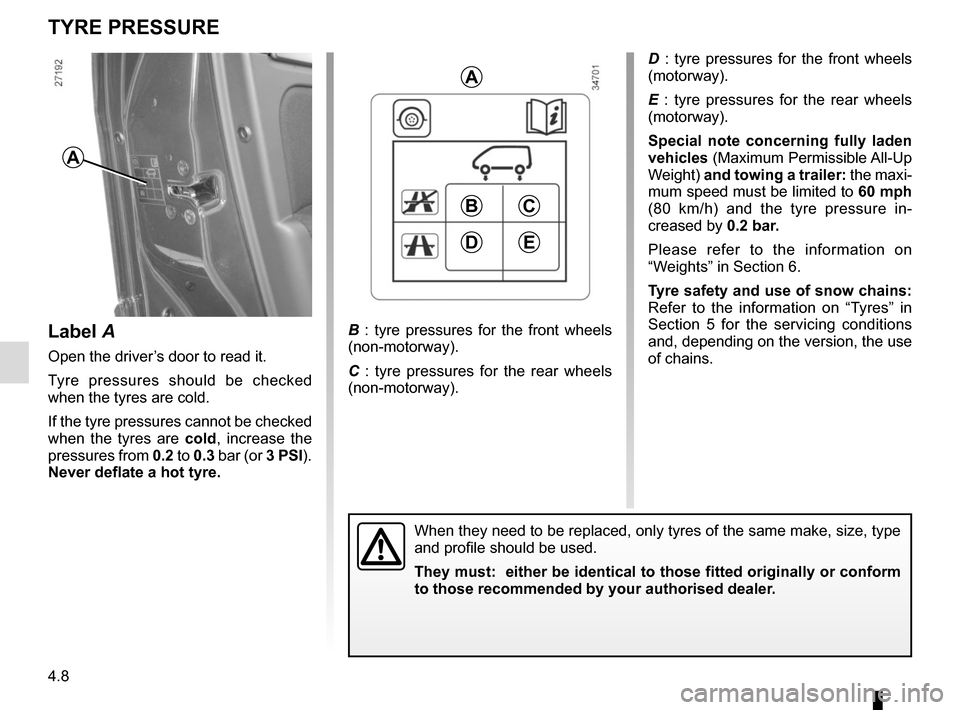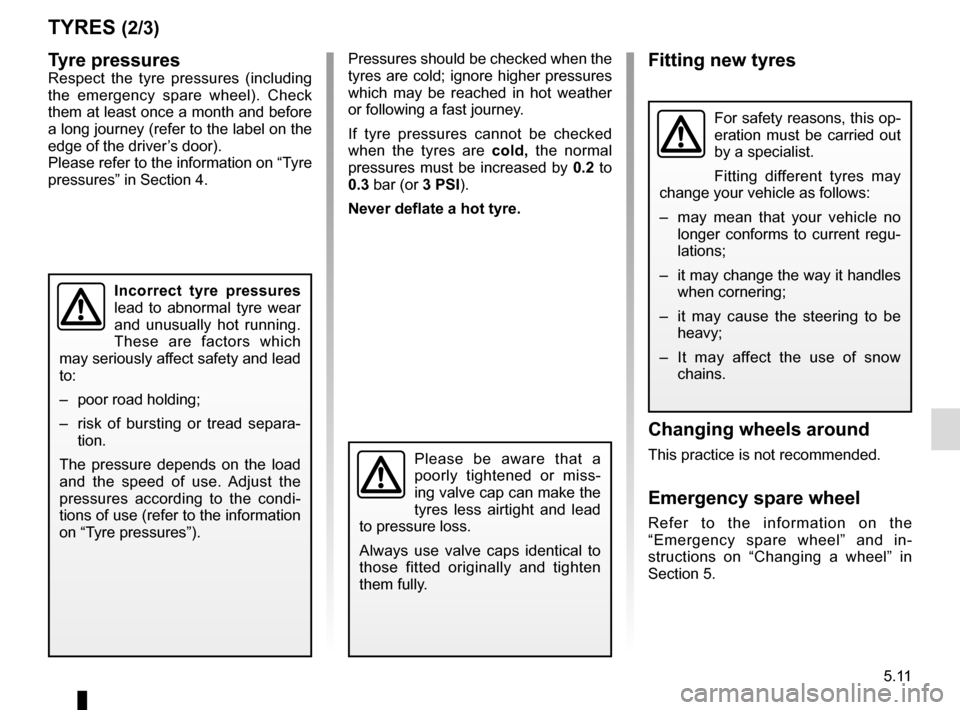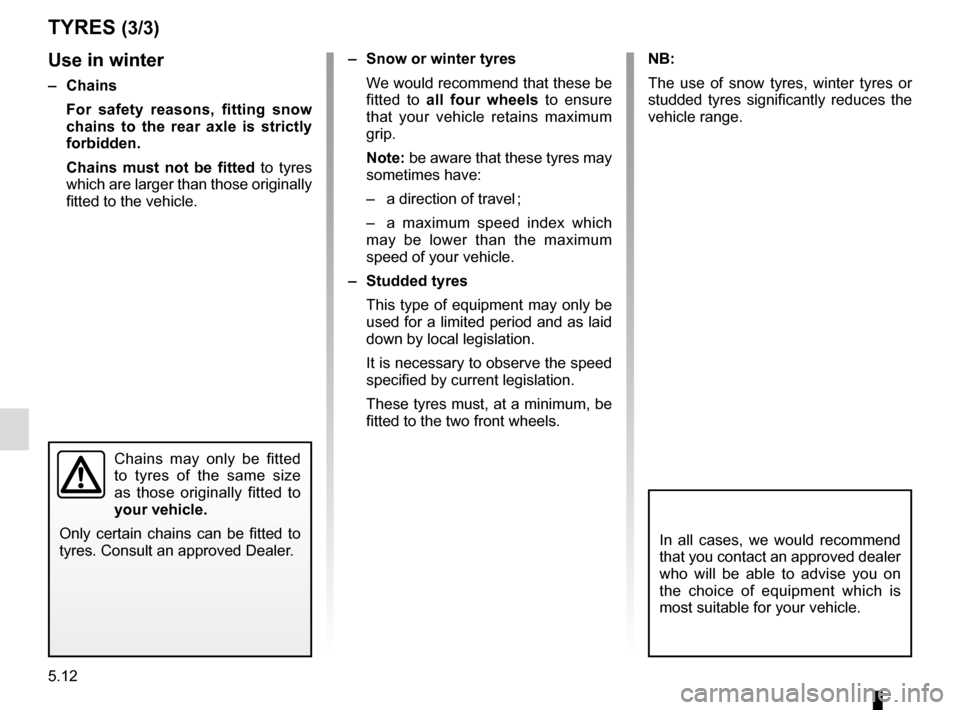snow chains RENAULT KANGOO VAN ZERO EMISSION 2012 X61 / 2.G Owners Manual
[x] Cancel search | Manufacturer: RENAULT, Model Year: 2012, Model line: KANGOO VAN ZERO EMISSION, Model: RENAULT KANGOO VAN ZERO EMISSION 2012 X61 / 2.GPages: 220, PDF Size: 4.52 MB
Page 152 of 220

4.8
TYRE PRESSURE
A
B : tyre pressures for the front wheels
(non-motorway).
C : tyre pressures for the rear wheels
(non-motorway). D : tyre pressures for the front wheels
(motorway).
E
: tyre pressures for the rear wheels
(motorway).
Special note concerning fully laden
vehicles (Maximum Permissible All-Up
Weight) and towing a trailer: the maxi-
mum speed must be limited to 60 mph
(80 km/h) and the tyre pressure in-
creased by 0.2 bar.
Please refer to the information on
“Weights” in Section 6.
Tyre safety and use of snow chains:
Refer to the information on “Tyres” in
Section 5 for the servicing conditions
and, depending on the version, the use
of chains.
BC
ED
A
When they need to be replaced, only tyres of the same make, size, type
and profile should be used.
They must: either be identical to those fitted originally or conform
to those recommended by your authorised dealer.
Label A
Open the driver’s door to read it.
Tyre pressures should be checked
when the tyres are cold.
If the tyre pressures cannot be checked
when the tyres are cold, increase the
pressures from 0.2 to 0.3 bar (or 3 PSI).
Never deflate a hot tyre.
Page 167 of 220

5.11
TYRES (2/3)
Pressures should be checked when the
tyres are cold; ignore higher pressures
which may be reached in hot weather
or following a fast journey.
If tyre pressures cannot be checked
when the tyres are cold, the normal
pressures must be increased by 0.2 to
0.3 bar (or 3 PSI).
Never deflate a hot tyre.Fitting new tyres
Changing wheels around
This practice is not recommended.
Emergency spare wheel
Refer to the information on the
“Emergency spare wheel” and in-
structions on “Changing a wheel” in
Section 5.
Tyre pressuresRespect the tyre pressures (including
the emergency spare wheel). Check
them at least once a month and before
a long journey (refer to the label on the
edge of the driver’s door).
Please refer to the information on “Tyre
pressures” in Section 4.
Incorrect tyre pressures
lead to abnormal tyre wear
and unusually hot running.
These are factors which
may seriously affect safety and lead
to:
– poor road holding;
– risk of bursting or tread separa- tion.
The pressure depends on the load
and the speed of use. Adjust the
pressures according to the condi-
tions of use (refer to the information
on “Tyre pressures”).
Please be aware that a
poorly tightened or miss-
ing valve cap can make the
tyres less airtight and lead
to pressure loss.
Always use valve caps identical to
those fitted originally and tighten
them fully.
For safety reasons, this op-
eration must be carried out
by a specialist.
Fitting different tyres may
change your vehicle as follows:
– may mean that your vehicle no longer conforms to current regu-
lations;
– it may change the way it handles when cornering;
– it may cause the steering to be heavy;
– It may affect the use of snow chains.
Page 168 of 220

5.12
TYRES (3/3)
Use in winter
– ChainsFor safety reasons, fitting snow
chains to the rear axle is strictly
forbidden.
Chains must not be fitted to tyres
which are larger than those originally
fitted to the vehicle.
Chains may only be fitted
to tyres of the same size
as those originally fitted to
your vehicle.
Only certain chains can be fitted to
tyres. Consult an approved Dealer.
– Snow or winter tyres We would recommend that these be
fitted to all four wheels to ensure
that your vehicle retains maximum
grip.
Note: be aware that these tyres may
sometimes have:
– a direction of travel ;
– a maximum speed index which
may be lower than the maximum
speed of your vehicle.
– Studded tyres This type of equipment may only be
used for a limited period and as laid
down by local legislation.
It is necessary to observe the speed
specified by current legislation.
These tyres must, at a minimum, be
fitted to the two front wheels.
In all cases, we would recommend
that you contact an approved dealer
who will be able to advise you on
the choice of equipment which is
most suitable for your vehicle.
NB:
The use of snow tyres, winter tyres or
studded tyres significantly reduces the
vehicle range.